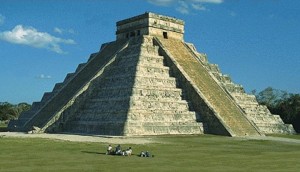
The prediction that the world would end this past year on December 21st was an inaccurate portrayal of the Mayan culture’s very intricate and sophisticated solar calendar. Granted, the 13th baktun ended on that date (a baktun is 394 years) and all that is listed in the Mayan calendar is baktun 1-13. There is little to no indication that this was meant to signal the end of time. Many spiritual teachers were quick to point out that the absence of a calendar beyond 2012 signaled a change in our relationship with time—a shift in consciousness after 5122 years.
There is a Jewish tradition that the world (as we know it) will not extend beyond 6,000 years. This tradition is elaborated upon in the Kabbalah, particularly the Zohar. Curiously, the propitious time for an evolution in world consciousness according to the Zohar began in the secular year 1240, corresponding to the year 5,000 in the Hebrew calendar. We have now been counting every 60 years since then—every 60 years represents another movement on the clock of consciousness. The next tick of that clock is the year 2020.
Both Jewish and Maya cultures take extreme pride in their abilities to formulate an accurate calendar system. The Maya were solar based while the Jews were lunar based. Both created a system for adjusting the actual length of the year to correspond with the actual rotation of the earth around the sun. Is it not an amazing confluence of the Maya and Jewish cultures that both start ‘counting’ the beginning of the world close to 5,000 years ago? The Hebrew calendar pushes the date back further and calculates the beginning of the creation of mankind to 5773 years ago—a good six hundred plus years ‘ahead’ of the Mayan calendarical count.
Let’s pause though to think what it means to have an “end date” to world history (as we know it).
Does having an end date engender a crisis or create complacency? Perhaps it does neither—but I can tell you that as we approach the year 2240—corresponding to the year 6,000 on the Hebrew calendar-there will be serious speculation about what that Rosh Hashanah portends.
What is then our spiritual charge for 2013 or 2240? It is, as always, to change our relationship with time. Is there a beginning or an end to time? There is now—the present moment.
P.S. When congregants came to ask my father about a date in the Hebrew calendar he would consult a thin blue volume called the Perpetual Hebrew Calendar. I doubt they still publish such a book. One can look up dates on any number of Hebrew calendar resources on the web. It always fascinated me that the blue book was thin—I knew as a boy that it wasn’t designed in perpetuity. It is equally fascinating that on web-based Hebrew calendars you can type in dates hundreds of years from now—well passed the year 2240.









1 Comment
Gail Loyd · January 3, 2013 at 4:44 pm
David: Just as we know that matter and energy are the same thing, we know that time and space are the same thing. So on 2040 does the universe implode? I don’t think so. If 2040 and the tension I feel in “The Force” mean anything, I’d say we have gone about as far down the path we are on as the laws of nature will permit. Either we will come to our senses and make some radical changes, radical enough to bring the Messiah, or the human experiment on this particular planet will end. Some of us have already changed, some of us are in process, but a great many of us are frightened and fighting the change more and more viciously. I expect that we will make it, but as Thornton Wilder says “By the Skin of Our Teeth”.
Gail